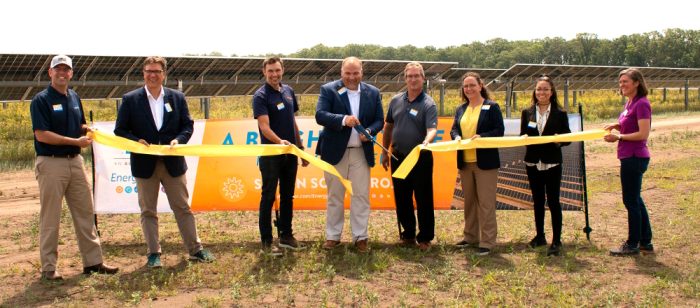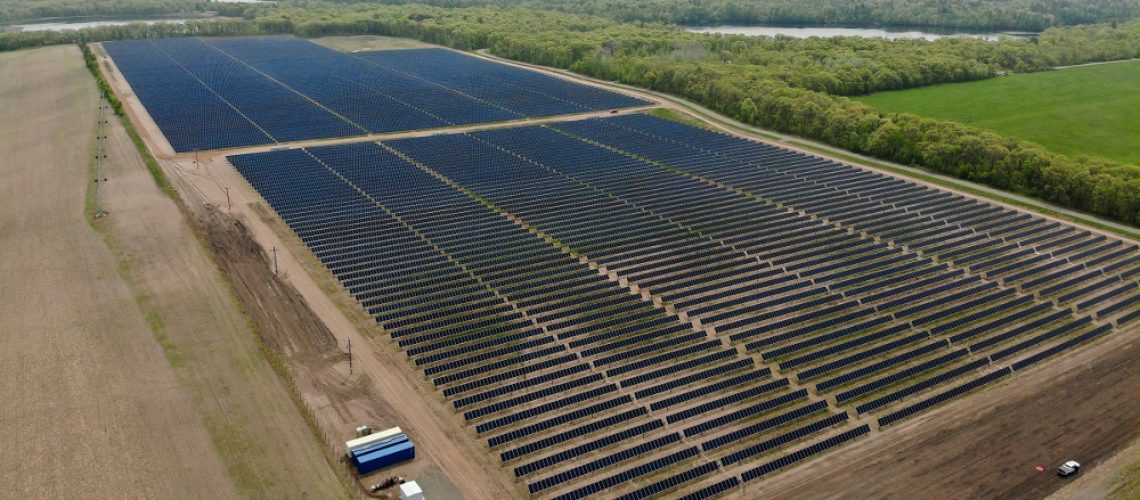Minnesota Power celebrated a renewable solar energy milestone last week with a ribbon-cutting at its recently completed Sylvan Solar Project near Brainerd, Minnesota.
The project is the last — and by far the largest at about 80 acres and 15.2 MW — of three projects totaling more than 20 MW meant to boost the region’s economic recovery from the COVID-19 pandemic. Minnesota Power invested about $40 million in the three solar projects approved by the Minnesota Public Utilities Commission. The company also constructed a 5.6 MW solar array near at the company’s Laskin Energy Center in Hoyt Lakes and a 1.6 MW facility along Jean Duluth Road in Duluth.
All three projects were built using more than 60,000 solar panels sourced from Heliene, which has a manufacturing facility in Mountain Iron, Minnesota. At the height of Sylvan project construction in late 2022, about 33 local union construction workers were on the job.
The Sylvan project also featured a unique partnership with White Earth Tribal and Community College and the Rural Renewable Energy Alliance to provide White Earth students with hands-on learning as part of a solar training certificate program to help build the workforce of the future.
“I’m so proud of the Minnesota Power team behind these solar projects as we dedicate the last and largest of the three today,” said Josh Skelton, chief operating officer at Minnesota Power, which is an operating division of ALLETE. “From conception through procurement, construction and completion, you have done exactly what we set out to do, support the regional economy and generate more local renewable energy. This investment in clean energy supports local jobs, local education, local manufacturing and local communities as we strive to create a just and equitable transition to a carbon-free future with opportunities for all.”
Energy from the site feeds Minnesota Power’s overall system, adding more renewable solar energy to the grid that serves the company’s 150,000 customers. Its output is expected to be about 29,000 MWh per year, or enough energy to power about 3,400 homes.
“COVID was a challenging time for utilities. We did not have the answer, but we knew we needed to do something to keep our utilities working and moving toward our energy goals,” said Joseph Sullivan, vice chair of the Minnesota Public Utilities Commission. “Minnesota Power responded to the commission and the state of Minnesota when we needed them. This is Minnesota Power investing in its communities and that’s what’s special about it. This embodies the commitment of a utility to its community.”

Under its EnergyForward strategy, Minnesota Power’s energy portfolio now has approximately 30 MW of solar energy, including the existing 10 MW solar array at Camp Ripley, the Minnesota National Guard Base near Little Falls. The investment in the three solar projects is part of Minnesota Power’s EnergyForward vision to achieve a 100% carbon-free energy supply. Minnesota Power also has a community solar garden with a 40 kW array in Duluth and purchases power from a 1 MW array in Wrenshall.
“Today is an amazing opportunity to celebrate the clean-energy transition in action,” said Julie Pierce, VP of strategy and planning at Minnesota Power. “The local investments benefit the communities surrounding the projects, and the carbon-free electricity will be felt far and wide for all of our customers. This project shows that through thoughtful planning and collaboration, and by working together, we can help build a carbon-free future right here in northern Minnesota.”
All three solar projects highlight Minnesota Power’s commitment to diverse and local suppliers and contractors. For all three projects combined, contracts with women-owned businesses totaled nearly $80,000; contracts with veteran-owned businesses totaled nearly $9,000; and contracts with companies that employ people with disabilities totaled more than $75,000. Contracts with local suppliers and contractors for the three projects totaled $36 million.
“Minnesota Power has not only been a leader in carbon reduction, but they’re demonstrating how to transition to clean energy sources without leaving workers behind,” said Lucas Franco, research manager for LIUNA Minnesota and North Dakota. “They are ensuring that their new clean-energy investments create high-quality, family-sustaining jobs for local workers.”
Minnesota Power provides electric service within a 26,000-square-mile area in northeastern Minnesota, supporting comfort, security and quality of life for 150,000 customers, 14 municipalities and some of the largest industrial customers in the United States.
Tags: Heliene, Minnesota Power, utility-scale



